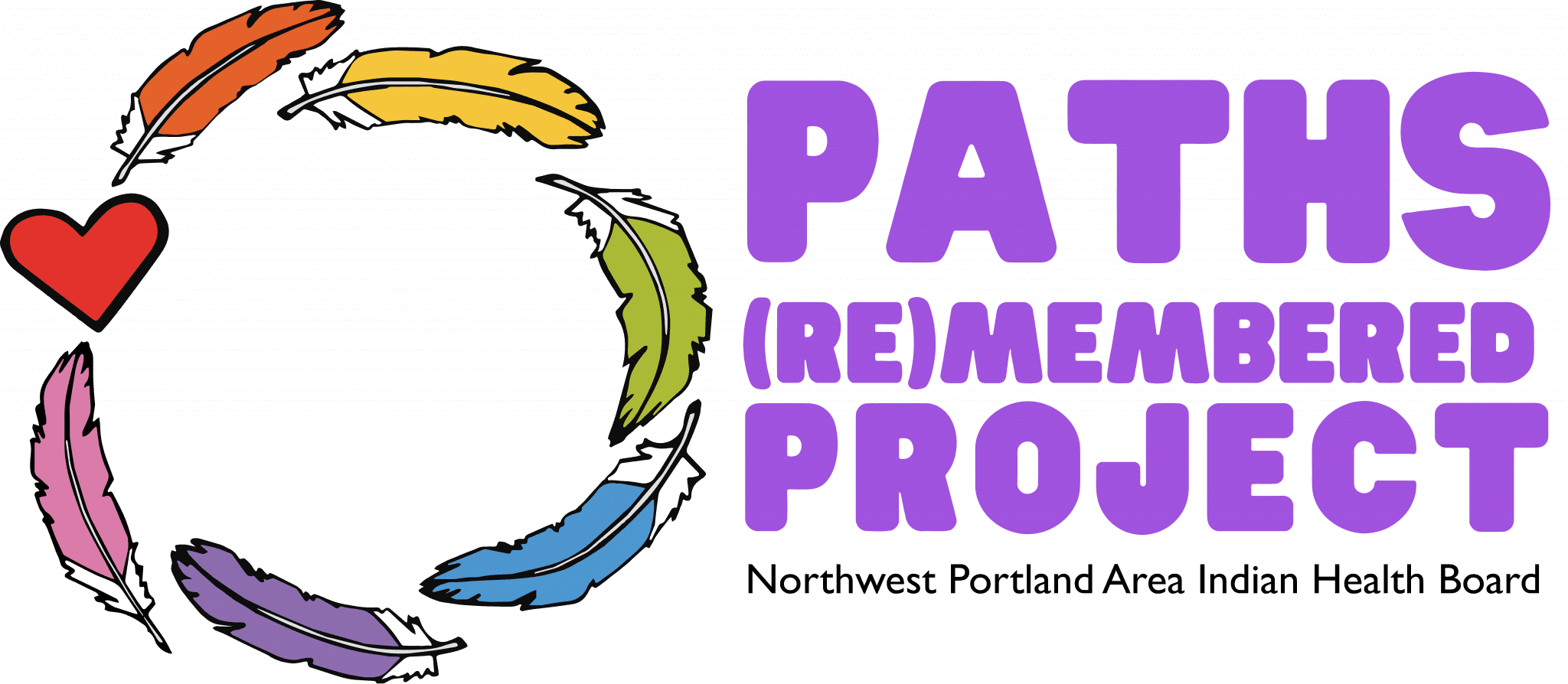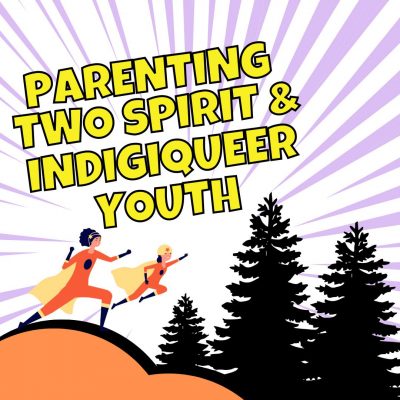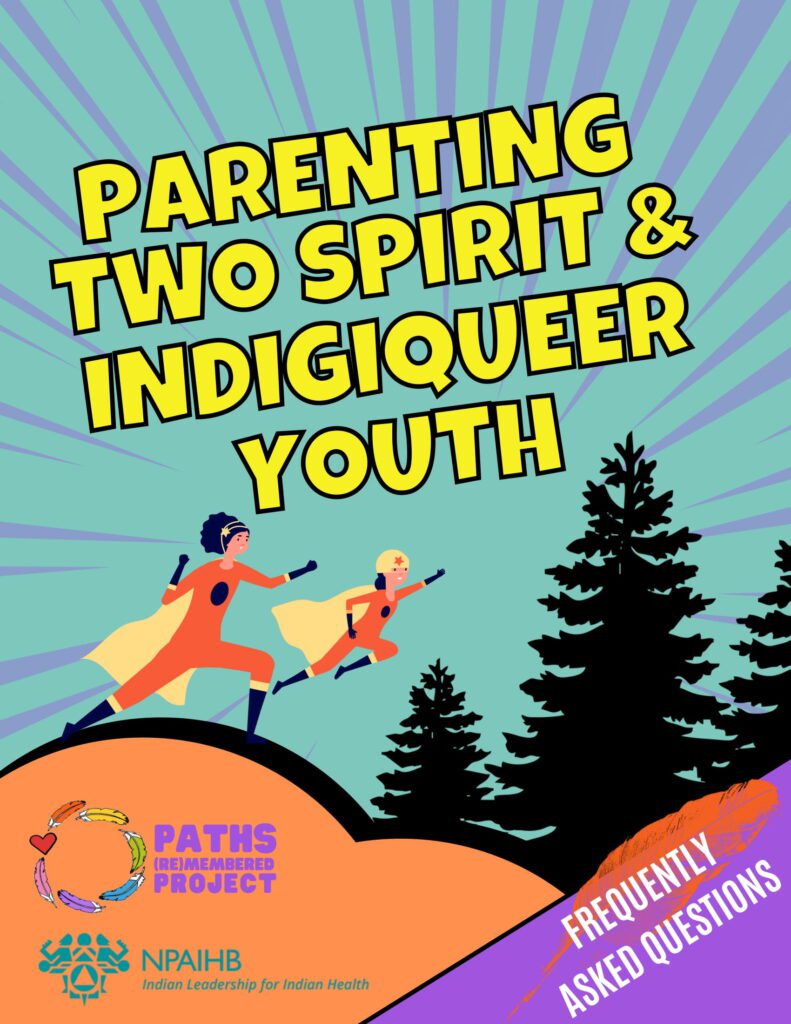Could you introduce yourselves?
Ticey: My pronouns are she/her. I am a citizen of the Confederated Tribes of Siletz Indians. My bands are Sixes (Kwatami), Mikonotunne, Joshua (Chemetunne), Chasta Costa, Tututni. I am a 48 year-old mother of three boys. I have a 25 year-old, a 22 year-old, and a 13 year-old. My 22 year-old identifies as pansexual and my 25 year-old identifies as bi. I’ve been working at the Northwest Portland Area Indian Health Board for 18 years.
Lisa: My pronouns are she/her, and I identify as Indigiqueer. I’m an enrolled member of the Choctaw Nation of Oklahoma. I live here in Coast Salish territory. I have two children—a six year-old, soon to be seven-year-old and a 10-and-a-half year-old, both identifying as non-binary, and I’m really happy to be here and be able to discuss this topic.
What are the joys and excitements of raising a gender-expansive, trans, or queer child?
Ticey: For me, I’m just learning so much from my kids, as they become comfortable with who they are. Their confidence, openness, and non-judgement has really helped me realize hidden biases that I have. It’s been exciting to learn, and just see them be happy with who they are.
Lisa: Yeah, going off of the openness idea—my children are young enough they don’t know bias yet. They don’t know the pressures of the colonial binary. That has been such a joy and an eye-opening life-opening experience for me as a mother, because I didn’t have the advantage of that growing up in a Christian colonial household. To see how children look at the world from an unhindered standpoint, and trying to also navigate that as Chahta Ohoyo, a Choctaw woman and a mother, has been beautiful. We think and talk about how the world can offer a lot more…I keep coming up with the word joy. How the world can be a lot more joyful if you’re not pressed into a box of how you’re supposed to be or how you’re how you’re supposed to dress or look. It’s been a great thing to witness. I’ve also been able to teach my children some Choctaw teachings I’ve learned, what I’m still learning, about the roles that our Two Spirit people had and still have. It’s a great way for them to build up their self-esteem and their confidence as non-binary Two Spirit youth.
What challenges have come up?
Lisa: It’s a funny thing, the world we’re living in right now. Challenges come more easily to my mind than joys do. I’m hoping that’ll change one day. We’re living in such a horrendous time—of hate, misunderstanding, miseducation about LGBTQ+ youth. Being Two Spirit is even further from the radar of the general public. It’s been a challenge to decide when I’m going to shield my children from that hate and when it’s important to educate them about it, to help make them strong warriors, because that’s what it’s going to take to be in this world. What’s helped is seeing positive leadership not only among Native people, but also among non-Native people.
I grew up in Texas, so seeing all of the venom-fueled legislation down there really affected me. At first, I wasn’t going to bring it up with my 10 year-old, because I’m trying to keep their joy up as long as possible before the world shoots it down. But Kai Shappley is a really outspoken activist in Texas, and she’s my kid’s age, 10 or 11, She’s going and testifying to the legislature, saying, “Why do you hate me so much?” A child can comprehend this, can understand the gravity of the moment and speak out. I thought, Well hell, if she can do this, then I can have tell my child what’s happening, why we can’t go home to visit our family.
I identify as Indigiqueer as well, so I’m not only a mother, but also as a community member that feels these things. There’s been a lot of hurt. What’s helped me grieve as a parent has been community all over the country, all over the continent. I have Two Spirit, gender-nonconforming community online all over, and that’s been a big support. Us coming together and keeping our joy has been such a blessing during this difficult time.
Ticey: I would say the challenges for me are in my feeling the need to protect my kids. My kids are half-Black. We’ve had situations where we haven’t been able to go to a family’s house because I couldn’t be sure that my kids would be welcome or safe. I worry they could be targets. I’m a fierce protector.
There used to be times when my 22 year-old would wear certain things, and I’d say, You need to go back and change. I feel embarrassed telling you all that, because it wasn’t intentional. He’s since educated me, telling me this is how he wants to express himself. Also, when they were younger and I had a feeling one of my kids might be queer, I asked him. I feel embarrassed by that now. I wanted to know, so that I could protect him, and I remember one of my friends said, What does it matter if he was or wasn’t, would you love him any less? And I said, Absolutely not. They said, Then why ask? Why do you need to know?
That was a pivotal moment for me, realizing I don’t need to ask. Sometimes my kids don’t need to be protected, they need to be supported. The challenge for me is knowing how to provide support without being overbearing, recognizing my hidden biases. When I grew up, people got bullied for wearing the wrong things, and I worried about my kids getting bullied, but they didn’t want protection from that. They just wanted to express themselves. And they have every right to do that. My kids are such great souls. They are really confident and secure in themselves. I’m learning to admit my mistakes and talk through them, and my kids are very forgiving.
Lisa: I want to speak on that, too. It has been such a gift of humility, going through this as a person who thought they knew it all. I’ve been out since I was 19. You think you know everything, that you’re going to be an awesome parent about this, thinking, “my kids are so lucky.” Only to realize you don’t know anything. Especially when it comes to gender. When our kid came out five years ago, my husband and I were like, Wow, we don’t know anything. This is going to be such an educational journey. And it has been. So enlightening, such a gift.
Are there are any resources you wish you to make that process of self-education and conversation easier?
Ticey: The 2SLGBTQ+ Talking Circles at the health board have been really useful for me. I’m still learning what everything means—Two Spirit, pansexual, gay, bi. Just knowing the different definitions between those terms, having a better awareness of what each term means in order to use them correctly, really helps. My 22 year-old identifies as pansexual, so he loves based on the feeling of a person. It doesn’t matter what gender they are. That’s how he describes it to me. Aside from that, I just had to realize that what I’d envisioned for my kids—having kids of their own, getting married, girlfriends, wives, that these things I had in my head were for me. Not for them.
Lisa: Among our Choctaw community in the Pacific Northwest and, collectively, online, there’s been a need to understand more about our Two Spirit people—language, roles. Luckily, I have a couple of Southeastern elders in my life who identify as Two Spirit and queer. I’ve been able to talk over some things with them, but there’s still a lot that has been lost or kept secret. I know people from other tribes are struggling with this as well. We have some of the names that we used for different genders, but I wish we had more knowledge about how these people served our communities specifically, our own tribal people. It’s been great to go online and see Instagram posts about other tribes, their words for gender, it’s so affirming. It helps me to remember that a lot of us had expansive gender roles in our community. I can share that with my children—Hey, we’ve always had these different roles in our communities. Look at these tribes for example. I know some things are kept private for a reason, culturally, but seeing a compiled list of words and meanings of gender roles in different tribes would be really meaningful. English is so limited. We don’t have a lot of English words for gender like my tribe does, or other tribes do. English isn’t meant to express all of these different meanings behind gender and roles. This is why it’s helpful to know your own tribal language, so you can you can feel more confident about who you are, not just as a Two Spirit person, but within your specific tribal language.
Thanks to our conversation with Lisa and Ticey, Paths (Re)Membered has created an FAQ for parents of Two Spirit and Indigiqueer children and has begun a monthly virtual meet-up for parents. Email pathsremembered@npaihb.org to join us.



